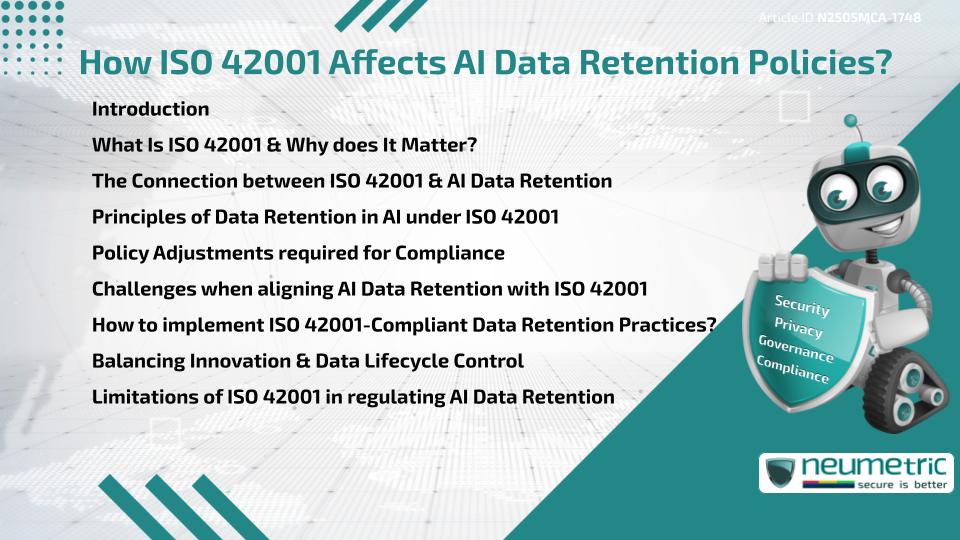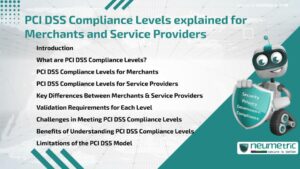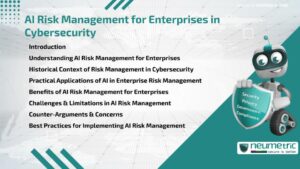Table of Contents
ToggleIntroduction
As Artificial Intelligence [AI] systems continue to evolve, Data Retention has become one of the most sensitive areas of Governance & Compliance. ISO 42001, the first International Standard for AI Management Systems, introduces guidelines that directly impact how Organisations handle the Data Lifecycle in AI Applications.
This article explores how ISO 42001 affects AI Data Retention Policies, providing clarity for Compliance Officers, Developers & Business Leaders seeking to align ethical AI use with Operational needs.
What Is ISO 42001 & Why does It Matter?
ISO 42001 is an international standard that establishes a framework for managing Risks & Responsibilities unique to Artificial Intelligence through an Artificial Intelligence Management System [AIMS].
Unlike earlier standards such as ISO 27001, which focus primarily on Information Security, ISO 42001 provides a structured methodology for addressing the broader Operational & Societal impacts of AI—including Data Retention Policies.
The Connection between ISO 42001 & AI Data Retention
Understanding how ISO 42001 affects AI Data Retention Policies starts with recognising that data fuels AI Systems. These systems rely on historical datasets to train Models, make Predictions & generate Insights.
However, retaining data indefinitely raises serious Ethical, ;egal & Operational questions—especially around Data Minimisation, Privacy Rights & Model Explainability. ISO 42001 addresses these through clear expectations for Data Lifecycle Control.
The Standard links AI Data Retention to key areas such as:
- Purpose limitation
- Data accuracy
- Retention period justification
- Risk-based Data Management
Principles of Data Retention in AI under ISO 42001
The Core Principle in ISO 42001 is ensuring that data is retained only as long as necessary for its original purpose. Here is how that applies to AI:
- Purpose Alignment: Data must be collected & retained only for explicitly defined AI objectives.
- Retention Limits: Organisations are required to define maximum retention periods based on Impact Assessments.
- Disposal Mechanisms: Secure Deletion or Anonymisation must follow once data has served its intented purpose.
- Audit Trails: Documenting Data Lifecycle decisions is required to demonstrate responsible Governance.
Each of these practices reflects how ISO 42001 affects AI Data Retention Policies by embedding Ethical Reasoning into Technical Decisions.
Policy Adjustments required for Compliance
To comply with ISO 42001, Organisations must adjust existing Retention Policies to meet new AI-specific Criteria. These include:
- Establishing Data Retention timelines specific to different AI use cases
- Including AI Data Lifecycle considerations in Enterprise Data Governance Frameworks
- Creating Cross-functional Teams (Legal, IT, AI/ML, Compliance) to evaluate Policy Fit
- Updating Privacy Notices & Consent Mechanisms to reflect automated Data Usage
Challenges when aligning AI Data Retention with ISO 42001
Understanding how ISO 42001 affects AI Data Retention Policies also requires awareness of the real-world challenges organisations face:
- Dynamic AI Models: Some models continually learn from new data, making retention timelines hard to define.
- Data Interdependencies: Deleting certain data can break the integrity of AI Model Inputs or Performance Logs.
- Third Party Data: Cloud Providers & Third Party APIs complicate control over Data Retention & Deletion.
These challenges require adaptive Policies & tools that allow granular control without compromising functionality.
How to implement ISO 42001-Compliant Data Retention Practices?
Here is a step-by-step look at implementing AI Data Retention Policies aligned with ISO 42001:
- Conduct AI Data Mapping: Identify What data feeds into which models, Where it is stored & How long it is used.
- Perform Retention Risk Assessments: Classify Data based on Sensitivity, Purpose & Business need.
- Define AI-Specific Retention Policies: Set clear Retention & Deletion rules for each category.
- Automate Retention Controls: Use Tools to Auto-delete or Anonymise Data after defined periods.
- Monitor & Audit: Continuously Review Compliance with both ISO 42001 & local Data Protection Laws.
Balancing Innovation & Data Lifecycle Control
One of the most important insights into how ISO 42001 affects AI Data Retention Policies is the tension between Innovation & Compliance. Longer Data Retention can improve Model Performance, but it also increases exposure to Risk.
Striking the right balance involves:
- Defining AI Model performance metrics that do not rely solely on Historical Data
- Incorporating Synthetic or Anonymised Datasets where feasible
- Continuously validating that retained data is still relevant to the AI’s intended use
These strategies help ensure Ethical AI Practices without hampering progress.
Limitations of ISO 42001 in regulating AI Data Retention
Despite its scope, ISO 42001 is not a silver bullet. Its implementation depends heavily on Interpretation & Organisational maturity. Here are some key limitations:
- It does not prescribe exact retention periods, leaving room for ambiguity
- It may conflict with Sector-specific Regulations such as HIPAA or GDPR
- It assumes the presence of well-established data Governance Infrastructure, which not all Companies have
Takeaways
- ISO 42001 introduces structured expectations for responsible AI Data Management.
- Retention Policies must reflect purpose limitation, defined timelines & secure disposal.
- Compliance involves policy updates, cross-functional collaboration & active monitoring.
- Real-world challenges like Model Retraining or Data Dependencies require flexible solutions.
- Ethical innovation requires balancing data utility with Individual Rights & Compliance Mandates.
FAQ
How does ISO 42001 define appropriate AI Data Retention timelines?
ISO 42001 does not set fixed timelines. Instead, it requires organisations to justify their Data Retention durations based on use-case relevance & Risk.
Can Organisations retain AI Training Data indefinitely under ISO 42001?
No. ISO 42001 discourages indefinite retention unless there is a documented need & clear justification that aligns with Ethical & Legal Principles.
What Tools can support ISO 42001 compliant Data Retention Practices?
Data Lifecycle Management Tools with Policy Automation, Deletion Triggers & Audit Logs help enforce compliant AI Data Retention Practices.
Is Anonymisation considered sufficient for Data Retention Compliance?
Anonymisation is a valid strategy under ISO 42001 if it ensures the data cannot be re-identified & serves the intended AI application without Privacy Risks.
How do you balance AI Model retraining needs with ISO 42001 Data Retention rules?
You can use Anonymised, Synthetic or Updated Datasets to retrain models while avoiding unnecessary retention of sensitive or outdated information.
What Documentation is required for AI Data Retention under ISO 42001?
Organisations must maintain clear records of Data Types, Purposes, Retention periods & Disposal methods as part of their AIMS Documentation.
Is ISO 42001 applicable to all types of AI Systems?
Yes. ISO 42001 is designed to be applicable across different AI contexts, including Machine Learning, Expert Systems & Neural Networks.
Can ISO 42001 conflict with other Data Regulations?
It can overlap or conflict with laws like GDPR. In such cases, the stricter rule typically the law takes precedence over ISO 42001 guidance.
Need help?
Neumetric provides organisations the necessary help to achieve their Cybersecurity, Compliance, Governance, Privacy, Certifications & Pentesting goals.
Organisations & Businesses, specifically those which provide SaaS & AI Solutions, usually need a Cybersecurity Partner for meeting & maintaining the ongoing Security & Privacy needs & requirements of their Clients & Customers.
SOC 2, ISO 27001, ISO 42001, NIST, HIPAA, HECVAT, EU GDPR are some of the Frameworks that are served by Fusion – a centralised, automated, AI-enabled SaaS Solution created & managed by Neumetric.
Reach out to us!





